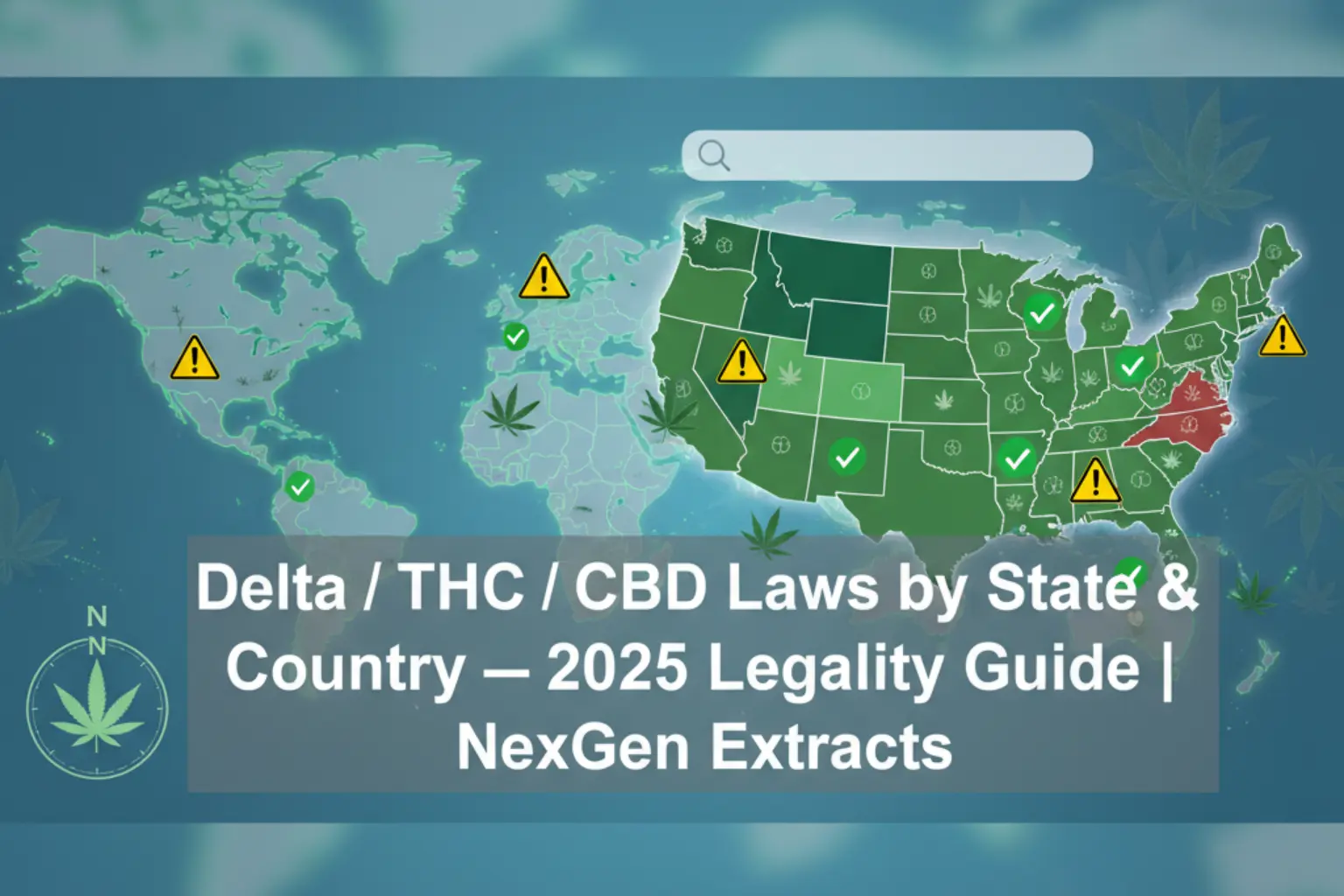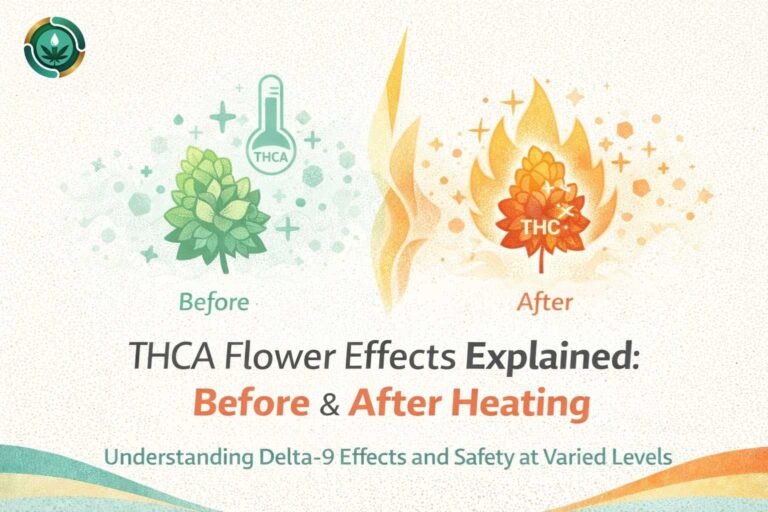
Understanding the Legal Maze of Hemp-Derived Products
The cannabis and hemp industry has evolved rapidly in recent years. From Delta 8 Gummies and THCa Flower to CBD Gummies, each product sits in a unique legal zone. Understanding these laws is vital for consumers, retailers, and health professionals alike.
This guide breaks down how Delta-8 THC, Delta-9, CBD, and THCa products are regulated across the United States and in select global regions. It’s designed to help readers stay compliant, informed, and safe — without the confusion of outdated or misleading claims.
1. The Foundation — What Makes Hemp and Cannabis Legal or Not?
In the United States, the 2018 Farm Bill marked a historic turning point. It legalized hemp-derived cannabinoids at the federal level, defining hemp as any cannabis plant containing less than 0.3% Delta-9 THC by dry weight.
This single number — 0.3% — separates hemp from marijuana under federal law.
Products like Delta 8 Gummies, CBD Gummies, and Delta 8 Oil became legal because they are derived from hemp and not directly from high-THC cannabis plants.
However, states have the right to make their own cannabis laws. That’s where things get complicated. While the Farm Bill opened the door federally, several states later restricted or banned hemp-derived cannabinoids like Delta-8 THC or THCa Gummies.
2. Delta-8 THC — A Federally Legal Gray Area
Delta-8 THC is a psychoactive compound derived from CBD through chemical conversion.
Since it doesn’t naturally occur in large amounts, most producers use hemp-derived CBD isolate and convert it into Delta-8 through a controlled laboratory process.
The DEA has stated that synthetic THC remains illegal. Yet Delta-8’s status depends on its origin — if it’s hemp-derived, it’s not classified as a controlled substance federally.
Still, about 20 U.S. states have enacted partial or full bans, citing safety and labeling issues. States like Colorado, New York, and Alaska have restrictions, while Florida, Texas, and Illinois allow it under certain conditions.
When purchasing Delta 8 Gummies or Delta 8 Oil, always verify lab reports (COAs) and ensure the product complies with local hemp regulations.
3. Delta-9 THC — The Traditional Cannabinoid with Tight Rules
Delta-9 THC is the primary psychoactive compound in cannabis. Under the Farm Bill, hemp-derived Delta-9 is legal only if it stays under 0.3% THC concentration.
That means Delta 9 Gummies made from hemp can be federally legal, as long as the THC content per gummy doesn’t exceed the federal threshold based on total dry weight.
However, states such as Idaho, Kansas, and Nebraska maintain complete bans on THC, regardless of its hemp origin.
Meanwhile, states like California, Oregon, and Michigan allow recreational and medical cannabis, making both Delta-9 and hemp-derived cannabinoids widely accessible.
So, when it comes to Delta 9 Gummies, legality is more about percentage and source than the cannabinoid itself.
4. THCa — The Rising Star with Complicated Rules
THCa Flower has become one of the fastest-growing hemp products in 2025.
THCa (Tetrahydrocannabinolic Acid) is the non-psychoactive precursor to Delta-9 THC. When exposed to heat (through smoking, vaping, or baking), it converts into psychoactive THC.
This has created a regulatory loophole — THCa products are legal if they meet the <0.3% Delta-9 limit in their raw state, even if they become intoxicating after decarboxylation.
Many states are now reviewing this issue. For example:
-
Texas and Tennessee currently allow THCa Flower and THCa Gummies as long as they are hemp-compliant.
-
Oregon and Colorado, however, have begun closing this loophole, regulating THCa as equivalent to marijuana.
Consumers should check lab results to confirm both Delta-9 and Total THC values before buying.
5. CBD — The Most Widely Accepted Cannabinoid
CBD Gummies remain legal across most U.S. states, provided they’re derived from hemp and contain less than 0.3% THC.
The FDA, however, has not approved CBD as a dietary supplement or food additive, which limits how it can be marketed. Despite this, many Americans use CBD for wellness support — from sleep and anxiety relief to chronic pain management.
States like California, Colorado, and Nevada have fully integrated CBD into their wellness markets. In contrast, South Dakota and Idaho still impose stricter retail regulations.
When purchasing CBD, ensure it’s third-party tested and labeled with clear cannabinoid content, batch number, and origin.
6. State-by-State Overview — The Simplified Breakdown
While an interactive map is ideal for tracking ongoing changes, here’s a simplified summary of how most U.S. states approach hemp-derived cannabinoids:
- Fully Legal States (Recreational + Hemp):
California, Colorado, Oregon, Washington, Nevada, Michigan, Maine, Massachusetts.
→ All cannabinoids (Delta-8, Delta-9, THCa, CBD) allowed under regulation. - Hemp-Only States (Farm Bill Compliance Only):
Texas, Florida, North Carolina, Indiana, Wisconsin.
→ Allow Delta-8 and CBD but regulate THCa and Delta-9 concentrations. - Restricted or Banned States:
Alaska, Colorado (Delta-8 only), New York, Vermont, Rhode Island, Arkansas.
→ Some cannabinoids like Delta-8 are banned despite overall cannabis legalization.
Always verify your state’s Department of Agriculture or Controlled Substances Act listings before purchasing. Laws shift quickly, and enforcement varies by county.
7. Global Overview — Hemp Laws Beyond the U.S.
The hemp and cannabinoid markets are expanding globally.
However, international regulations differ widely. Here’s a quick snapshot of major regions:
- Canada: Fully legalized recreational and medical cannabis. Delta-8 and Delta-9 products available through licensed stores only.
- United Kingdom: CBD legal if THC <0.2%. Delta-8 THC and THCa Flower remain prohibited.
- European Union: Most nations allow CBD; Delta-8 and Delta-9 largely banned or unregulated.
- Australia: CBD allowed with prescription; THC and Delta-8 remain illegal for general consumers.
- India: CBD and hemp seeds allowed; THC products restricted under NDPS Act.
- Japan & South Korea: Strict zero-THC tolerance — even hemp-derived cannabinoids often prohibited.
The global picture shows one key pattern: CBD is widely accepted, but psychoactive cannabinoids like Delta-8 or THCa face stronger restrictions.
8. Why Laws Differ So Much
Two main reasons drive the differences in laws — intoxication risk and regulatory infrastructure.
Governments worry about consumer safety when products like Delta 8 Gummies or Delta 8 Oil can cause impairment but appear on shelves without age restrictions.
Also, the lack of standardized testing creates labeling problems. Many samples tested by state labs have shown inaccurate THC levels or residual solvents from conversion processes.
This makes consistent federal regulation difficult, leaving the matter to individual states or countries.
9. What to Look for When Buying Hemp-Derived Products
No matter your location, safe shopping practices remain the same.
Follow this checklist to ensure your Delta 8 THC, Delta 9 Gummies, CBD Gummies, or THCa Flower are safe and legal:
- Check the Certificate of Analysis (COA):
Always verify third-party lab results for potency, solvents, and heavy metals. - Look for Transparent Labels:
Packaging should clearly state cannabinoid type, strength, and total THC levels. - Confirm Hemp Source:
Reputable products use U.S.-grown hemp tested under federal agricultural standards. - Avoid Products Without Batch Numbers:
Batch IDs ensure traceability and quality control. - Stay Updated on State Rules:
Bookmark your state’s hemp regulatory page — rules can change monthly. - Consult Professionals:
If you use prescription medication, check with your doctor before adding cannabinoids.
10. The Future of Hemp and THC Regulations
Experts predict a federal review of hemp cannabinoid laws by 2026.
The focus will likely be on potency caps, safety testing, and marketing restrictions for intoxicating hemp products like Delta 8 Gummies and THCa Gummies.
Meanwhile, consumers are becoming more educated. Demand for transparency and testing is growing rapidly.
Brands that invest in compliance and safety will shape the future of this market.
We can expect more state-specific labeling, online age verification, and lab transparency portals in coming years.
11. Key Takeaways
- Delta 8 THC and THCa Flower occupy legal gray areas — check your local regulations.
- CBD Gummies remain legal across most U.S. states but require quality verification.
- Delta 9 Gummies are federally legal only if derived from hemp and under 0.3% THC.
- Laws differ globally — always confirm country-specific hemp rules before purchasing.
- Prioritize lab-tested, transparent products for safety and compliance.
12. The Bottom Line
The cannabis landscape is changing faster than ever. For consumers, staying informed is the best protection.
At NexGen Extracts, we aim to bring accurate, readable, and research-backed information about cannabinoids — not to sell, but to educate.
Whether you prefer Delta 8 Oil, THCa Flower, or CBD Gummies, knowing your state’s laws keeps your experience safe and legal.
Use trusted sources, check testing results, and always respect local regulations when exploring this exciting and evolving hemp industry.



